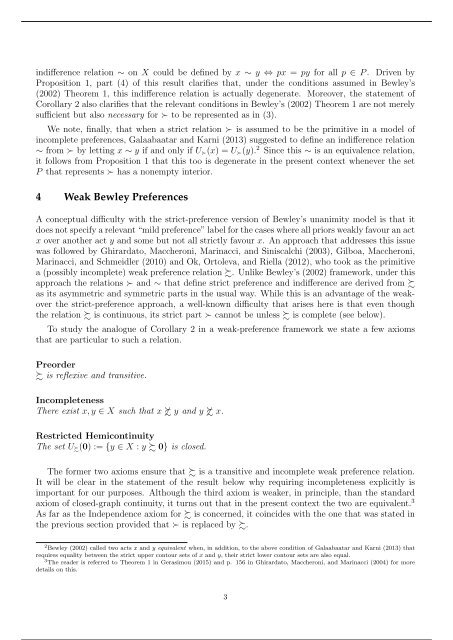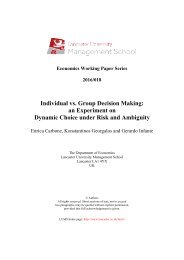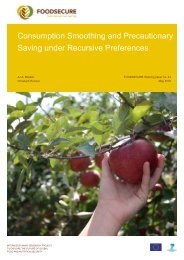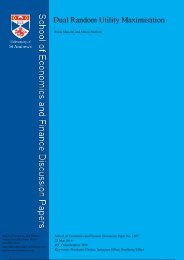Risk Neutrality Incompleteness and Degenerate Indifference
n?u=RePEc:san:wpecon:1609&r=upt
n?u=RePEc:san:wpecon:1609&r=upt
Create successful ePaper yourself
Turn your PDF publications into a flip-book with our unique Google optimized e-Paper software.
indifference relation ∼ on X could be defined by x ∼ y ⇔ px = py for all p ∈ P . Driven by<br />
Proposition 1, part (4) of this result clarifies that, under the conditions assumed in Bewley’s<br />
(2002) Theorem 1, this indifference relation is actually degenerate. Moreover, the statement of<br />
Corollary 2 also clarifies that the relevant conditions in Bewley’s (2002) Theorem 1 are not merely<br />
sufficient but also necessary for ≻ to be represented as in (3).<br />
We note, finally, that when a strict relation ≻ is assumed to be the primitive in a model of<br />
incomplete preferences, Galaabaatar <strong>and</strong> Karni (2013) suggested to define an indifference relation<br />
∼ from ≻ by letting x ∼ y if <strong>and</strong> only if U ≻ (x) = U ≻ (y). 2 Since this ∼ is an equivalence relation,<br />
it follows from Proposition 1 that this too is degenerate in the present context whenever the set<br />
P that represents ≻ has a nonempty interior.<br />
4 Weak Bewley Preferences<br />
A conceptual difficulty with the strict-preference version of Bewley’s unanimity model is that it<br />
does not specify a relevant “mild preference” label for the cases where all priors weakly favour an act<br />
x over another act y <strong>and</strong> some but not all strictly favour x. An approach that addresses this issue<br />
was followed by Ghirardato, Maccheroni, Marinacci, <strong>and</strong> Siniscalchi (2003), Gilboa, Maccheroni,<br />
Marinacci, <strong>and</strong> Schmeidler (2010) <strong>and</strong> Ok, Ortoleva, <strong>and</strong> Riella (2012), who took as the primitive<br />
a (possibly incomplete) weak preference relation . Unlike Bewley’s (2002) framework, under this<br />
approach the relations ≻ <strong>and</strong> ∼ that define strict preference <strong>and</strong> indifference are derived from <br />
as its asymmetric <strong>and</strong> symmetric parts in the usual way. While this is an advantage of the weakover<br />
the strict-preference approach, a well-known difficulty that arises here is that even though<br />
the relation is continuous, its strict part ≻ cannot be unless is complete (see below).<br />
To study the analogue of Corollary 2 in a weak-preference framework we state a few axioms<br />
that are particular to such a relation.<br />
Preorder<br />
is reflexive <strong>and</strong> transitive.<br />
<strong>Incompleteness</strong><br />
There exist x, y ∈ X such that x ̸ y <strong>and</strong> y ̸ x.<br />
Restricted Hemicontinuity<br />
The set U (0) := {y ∈ X : y 0} is closed.<br />
The former two axioms ensure that is a transitive <strong>and</strong> incomplete weak preference relation.<br />
It will be clear in the statement of the result below why requiring incompleteness explicitly is<br />
important for our purposes. Although the third axiom is weaker, in principle, than the st<strong>and</strong>ard<br />
axiom of closed-graph continuity, it turns out that in the present context the two are equivalent. 3<br />
As far as the Independence axiom for is concerned, it coincides with the one that was stated in<br />
the previous section provided that ≻ is replaced by .<br />
2 Bewley (2002) called two acts x <strong>and</strong> y equivalent when, in addition, to the above condition of Galaabaatar <strong>and</strong> Karni (2013) that<br />
requires equality between the strict upper contour sets of x <strong>and</strong> y, their strict lower contour sets are also equal.<br />
3 The reader is referred to Theorem 1 in Gerasimou (2015) <strong>and</strong> p. 156 in Ghirardato, Maccheroni, <strong>and</strong> Marinacci (2004) for more<br />
details on this.<br />
3






